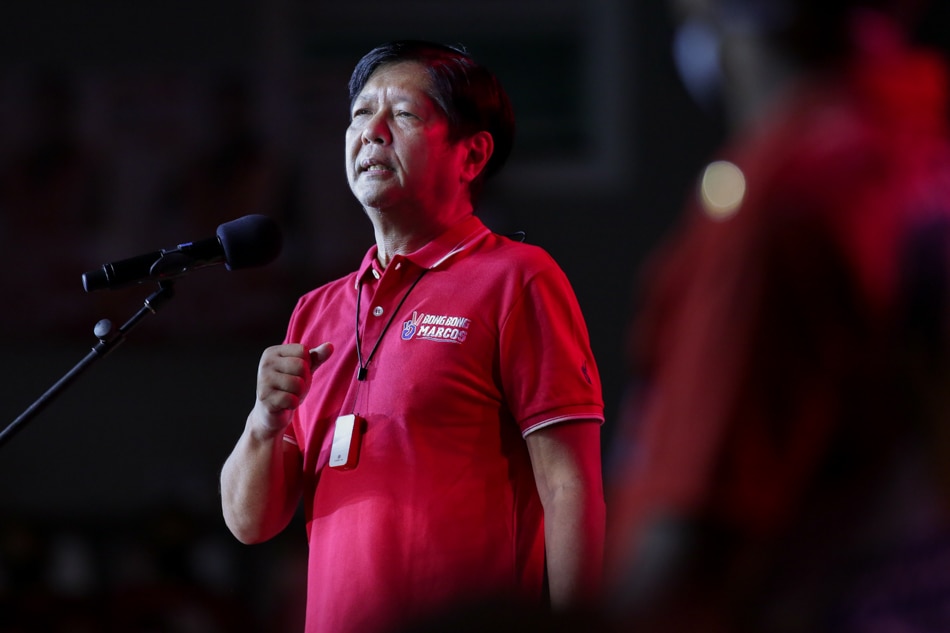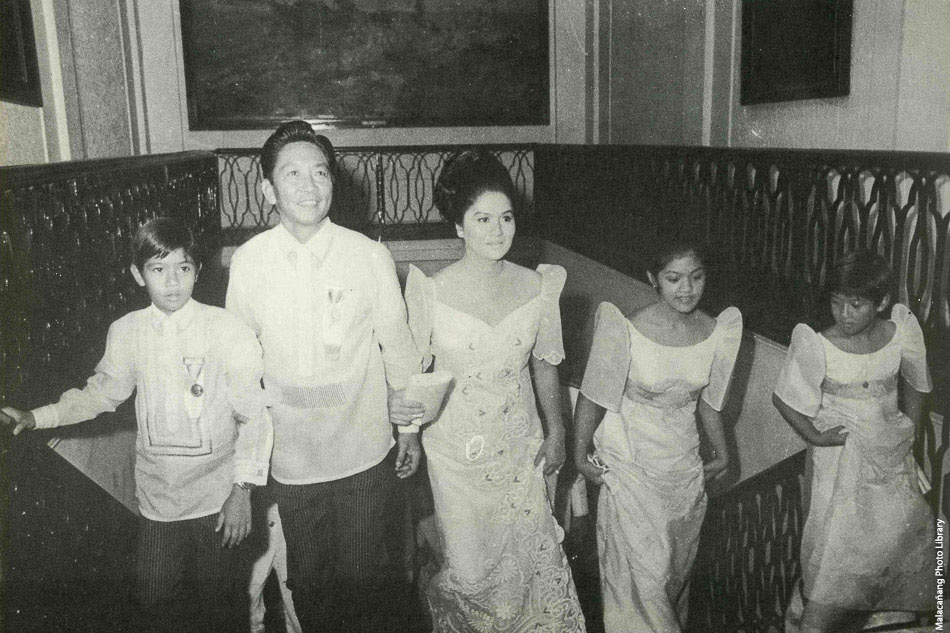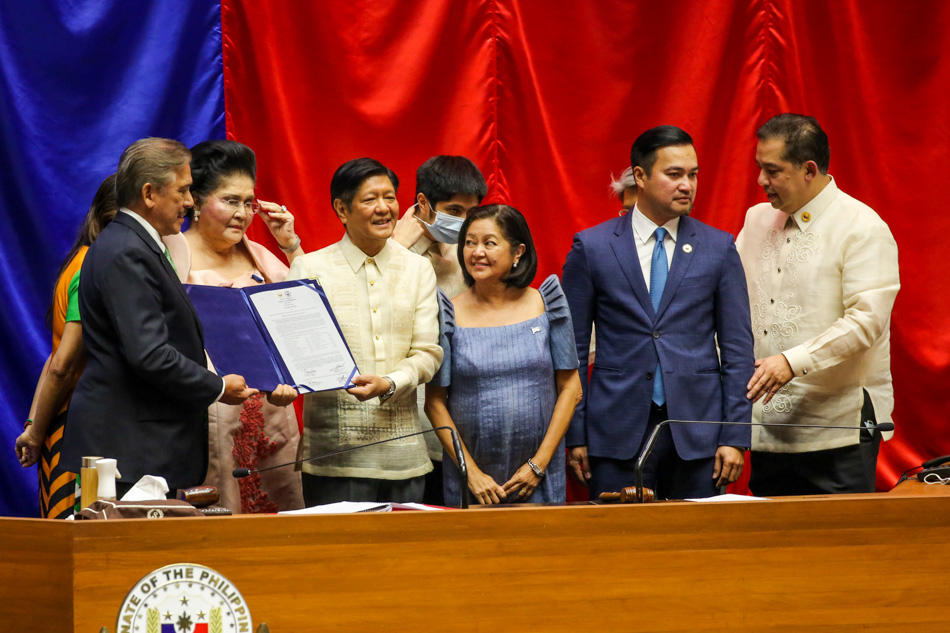Here comes the son: Bongbong delivers ultimate Marcos redemption | ABS-CBN
ADVERTISEMENT

Welcome, Kapamilya! We use cookies to improve your browsing experience. Continuing to use this site means you agree to our use of cookies. Tell me more!
Here comes the son: Bongbong delivers ultimate Marcos redemption
Here comes the son: Bongbong delivers ultimate Marcos redemption
Job Manahan,
ABS-CBN News
Published Jun 30, 2022 11:00 AM PHT
MANILA — Ferdinand Marcos Jr. on Thursday takes over the Philippine presidency, in what analysts say is the ultimate "redemption" for his family 36 years after an uprising toppled its patriarch.
MANILA — Ferdinand Marcos Jr. on Thursday takes over the Philippine presidency, in what analysts say is the ultimate "redemption" for his family 36 years after an uprising toppled its patriarch.
Marcos, 64, will succeed Rodrigo Duterte after a landslide victory in the May 9 elections with promises to unite Filipinos, tame rising prices, and spur jobs.
Marcos, 64, will succeed Rodrigo Duterte after a landslide victory in the May 9 elections with promises to unite Filipinos, tame rising prices, and spur jobs.
"I promise you that we may not be perfect but we will always strive to perfection," Marcos said last month, when Congress proclaimed him the duly elected president.
"I promise you that we may not be perfect but we will always strive to perfection," Marcos said last month, when Congress proclaimed him the duly elected president.
"I want to do well because when a president does well, the country does well, and I want to do well for this country."
"I want to do well because when a president does well, the country does well, and I want to do well for this country."
ADVERTISEMENT
His success at the polls defied his links to his father and namesake Ferdinand Marcos Sr.'s 2-decade rule marred by graft and human rights abuses.
His success at the polls defied his links to his father and namesake Ferdinand Marcos Sr.'s 2-decade rule marred by graft and human rights abuses.
Dr. Froilan Calilung of the University of Santo Tomas' political science department said Marcos Jr's presidency could be a "very crucial juncture" for his family.
Dr. Froilan Calilung of the University of Santo Tomas' political science department said Marcos Jr's presidency could be a "very crucial juncture" for his family.
"This is their redemption... given the fact that there were a lot of negative things that had been heard against the family for the past 36 years," Calilung told ABS-CBN News.
"This is their redemption... given the fact that there were a lot of negative things that had been heard against the family for the past 36 years," Calilung told ABS-CBN News.
"I think this is the best and most opportune time for them to actually change the landscape of how we understand and know Marcosian politics," he added.
"I think this is the best and most opportune time for them to actually change the landscape of how we understand and know Marcosian politics," he added.
'I WAS MY FATHER'S SON'
Born in Sta. Mesa, Manila on Sept. 13, 1957, the second child of Marcos Sr. and former beauty queen Imelda Marcos had wanted to be an astronaut and a rockstar when he was young.
Born in Sta. Mesa, Manila on Sept. 13, 1957, the second child of Marcos Sr. and former beauty queen Imelda Marcos had wanted to be an astronaut and a rockstar when he was young.
But growing up in the Malacañang, Marcos Jr. said, "No one would let me forget that I was my father's son."
But growing up in the Malacañang, Marcos Jr. said, "No one would let me forget that I was my father's son."
"Maliit pa nga ako, sasabihin, 'One day mag-Presidente ka, pabiro, pabiro," he said in a CNN Philippines interview that aired in April.
"Maliit pa nga ako, sasabihin, 'One day mag-Presidente ka, pabiro, pabiro," he said in a CNN Philippines interview that aired in April.
(I was still young when people started telling me, 'One day, you should be President.')
(I was still young when people started telling me, 'One day, you should be President.')
Marcos was at a boarding school in Britain when his father declared martial law in 1972. He later studied at the University of Oxford, where he got a special diploma in social studies.
Marcos was at a boarding school in Britain when his father declared martial law in 1972. He later studied at the University of Oxford, where he got a special diploma in social studies.
From 1980 to 1986, the year his father was overthrown, he served as vice governor and governor of Ilocos Norte province, his family's stronghold.
From 1980 to 1986, the year his father was overthrown, he served as vice governor and governor of Ilocos Norte province, his family's stronghold.
Marcos Jr. said martial law was something his father "had to do" to suppress communist and Muslim insurgencies.
Marcos Jr. said martial law was something his father "had to do" to suppress communist and Muslim insurgencies.
He claimed "fake news" was involved in issues regarding his family's ill-gotten wealth and estate tax liabilities, despite multiple court orders for them to pay millions of pesos back to government.
He claimed "fake news" was involved in issues regarding his family's ill-gotten wealth and estate tax liabilities, despite multiple court orders for them to pay millions of pesos back to government.
The former senator has also denied spreading false information about events during his late father's rule.
The former senator has also denied spreading false information about events during his late father's rule.
"To the world, he says: Judge me not by my ancestors, but by my actions," his incoming executive secretary Vic Rodriguez said in May.
"To the world, he says: Judge me not by my ancestors, but by my actions," his incoming executive secretary Vic Rodriguez said in May.
Marcos Sr. died while in exile in Hawaii in 1989. Four years later, his family returned to the Philippines and was elected to a succession of higher posts.
Marcos Sr. died while in exile in Hawaii in 1989. Four years later, his family returned to the Philippines and was elected to a succession of higher posts.
Marcos Jr. served as Ilocos representative, governor, and senator.
Marcos Jr. served as Ilocos representative, governor, and senator.
Hounded by questions on his family's history, he narrowly lost in the vice presidential race to Leni Robredo in 2016. They faced off again for the presidency and this time, Marcos skipped debates with rivals and gave few interviews.
Hounded by questions on his family's history, he narrowly lost in the vice presidential race to Leni Robredo in 2016. They faced off again for the presidency and this time, Marcos skipped debates with rivals and gave few interviews.
This move allowed Marcos to portray himself as someone who does not "want to pick a fight," said Dr. Julio Teehankee, a political science professor at the De La Salle University.
This move allowed Marcos to portray himself as someone who does not "want to pick a fight," said Dr. Julio Teehankee, a political science professor at the De La Salle University.
This decision is "calculated" which shows Marcos Jr.'s "pragmatism," said Calilung.
This decision is "calculated" which shows Marcos Jr.'s "pragmatism," said Calilung.
Marcos secured some 31 million votes, more than double Robredo's tally, making him the first majority president after the EDSA Revolution.
Marcos secured some 31 million votes, more than double Robredo's tally, making him the first majority president after the EDSA Revolution.
"Perhaps, I would say it might be considered a pardon," Teehankee said of Marcos's election triumph.
"Perhaps, I would say it might be considered a pardon," Teehankee said of Marcos's election triumph.
"You might be given a pardon but not necessarily forgiven because there has been no admission of whatever sins or crimes have been committed in the first place," he told ANC's Headstart.
"You might be given a pardon but not necessarily forgiven because there has been no admission of whatever sins or crimes have been committed in the first place," he told ANC's Headstart.
Historian Manolo Quezon III adds, "In our political culture, election is absolution for someone who is facing a controversy. You can agree or disagree about it but that is how it's often been perceived."
Historian Manolo Quezon III adds, "In our political culture, election is absolution for someone who is facing a controversy. You can agree or disagree about it but that is how it's often been perceived."
PRESIDENT MARCOS JR.
But what could be expected from the 17th President of the Philippines?
But what could be expected from the 17th President of the Philippines?
Teehankee believes Marcos Jr. "will be influenced, affected by his father's political style."
Teehankee believes Marcos Jr. "will be influenced, affected by his father's political style."
"But definitely it will be difficult for him to be an autocratic Marcos in this day and age," he said.
"But definitely it will be difficult for him to be an autocratic Marcos in this day and age," he said.
Marcos Jr. may also veer away from his predecessor's tough rhetoric and present himself as a "decent statesman," said Caluling.
Marcos Jr. may also veer away from his predecessor's tough rhetoric and present himself as a "decent statesman," said Caluling.
"[Marcos's] pronouncements are very leaning towards that which is generally acceptable and that which he feels is realistic and doable," said the analyst.
"[Marcos's] pronouncements are very leaning towards that which is generally acceptable and that which he feels is realistic and doable," said the analyst.
"I think he is a very methodical in his approach towards institutionalization of reforms as well as setting down his agenda. We saw it in the manner by which he picked the composition of his Cabinet," he added.
For Quezon, the "most fundamental question" that hangs over the Marcos administration is, "'Will it be focused on making a name for itself, or getting even?"
"I think he is a very methodical in his approach towards institutionalization of reforms as well as setting down his agenda. We saw it in the manner by which he picked the composition of his Cabinet," he added.
For Quezon, the "most fundamental question" that hangs over the Marcos administration is, "'Will it be focused on making a name for itself, or getting even?"
"What balance of the 2 will there be because at the end of the day, every president is human? ...The question on what will happen to critics, not just within official circles but in the wider world, will also be looked at," he told ANC.
"What balance of the 2 will there be because at the end of the day, every president is human? ...The question on what will happen to critics, not just within official circles but in the wider world, will also be looked at," he told ANC.
Calilung said Marcos should focus on making sure that his campaign promises, including unity, would "not be derailed by politics."
Calilung said Marcos should focus on making sure that his campaign promises, including unity, would "not be derailed by politics."
"If he will be drowned into the political power play, I think that will make him lose his track and probably lose his vision of steering the country towards the betterment," he said.
"If he will be drowned into the political power play, I think that will make him lose his track and probably lose his vision of steering the country towards the betterment," he said.
"This is more of a redefining moment for the family, for them to actually try to change all those negative pictures of the past, those negative attributes that were attached to the name."
"This is more of a redefining moment for the family, for them to actually try to change all those negative pictures of the past, those negative attributes that were attached to the name."
Read More:
Bongbong Marcos
who is Bongbong Marcos
Ferdinand Marcos Jr
Marcos profile
Marcos
Marcos inauguration
Marcos inaugural
Bongbong Marcos
BBM inauguration
Marcos 17th president Philippines
ADVERTISEMENT
ADVERTISEMENT





